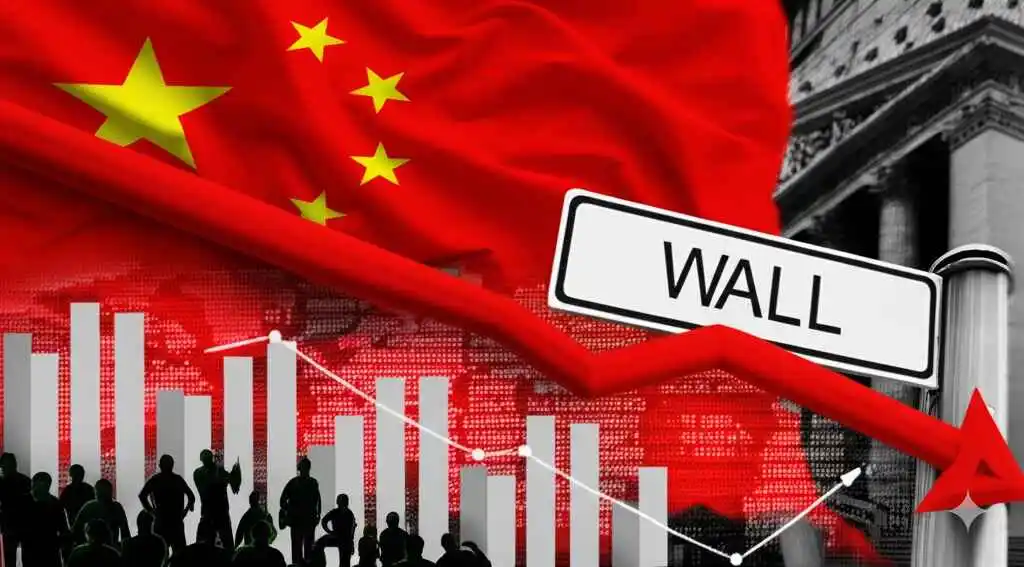Foreign Investment Risk China 2025
In the high-stakes world of global finance, words like “chaos” are not used casually—especially not by institutions like Goldman Sachs. But in its latest analysis, the investment giant is sounding alarms over a scenario that, if it plays out, could send shockwaves across international markets and unsettle global trade for years to come.
At the heart of the concern is a worsening standoff between the world’s two largest economies: the United States and China. The potential fallout? A forced delisting of Chinese companies from American stock exchanges—an unprecedented move that could trigger the withdrawal of hundreds of billions of dollars in capital and rattle the foundations of cross-border investment.

The $800 Billion Question
Goldman Sachs has painted a stark “extreme case” scenario, estimating that U.S. investors could be compelled to sell off as much as $800 billion worth of Chinese equities. This projection isn’t rooted in speculation alone—it reflects real risks associated with rising regulatory and diplomatic tensions between Washington and Beijing.
Many of these Chinese companies are traded in the U.S. via American Depository Receipts (ADRs)—financial instruments that mirror the price and performance of the original shares listed overseas. For example, Chinese tech giants like Alibaba and JD.com are held in American portfolios through ADRs, which allow U.S. investors to gain exposure without navigating foreign exchanges.
But if regulatory forces push these companies out of U.S. markets, ADRs could become untradeable, forcing funds and institutions to offload them—quickly and at scale.
A Chain Reaction Across Global Markets
The ramifications of such a move would be far-reaching. Major index providers like MSCI and FTSE Russell would likely be forced to remove delisted Chinese companies from their benchmarks. This would prompt a ripple effect, as index-tracking funds, including ETFs and mutual funds, would have no choice but to sell their holdings.
Goldman Sachs warns that such an event could cause a 9% to 14% drop in China-focused stock indexes. The scale of outflows could be staggering: over $1.3 trillion is currently tied up in U.S.-listed Chinese firms, much of it held by institutional investors who may face barriers to reinvesting elsewhere, especially if access to Hong Kong markets is also curtailed.
This financial chokehold, the report notes, could destabilize not just China’s markets—but also the global financial system at large.
Trading Cut Off, Liquidity Lost
One of the most immediate concerns is the potential loss of access to Hong Kong, where many Chinese firms have secondary listings. If U.S. institutions are blocked from trading there—as some policymakers have proposed—the liquidity crisis could deepen.
“Imagine being told to exit positions worth billions, but you have nowhere to redeploy,” one fund manager said anonymously. “It’s not just capital flight; it’s capital paralysis.”
Currently, U.S. institutions hold approximately $522 billion in Chinese company shares. Should companies like Alibaba be forced off American exchanges, it could become nearly impossible for global investors to maintain exposure to the Chinese market, short of setting up shop in mainland China—a regulatory and logistical minefield.
Diplomatic Deadlock
The source of this brewing storm lies in diplomacy—or the lack of it. While the U.S. has indicated an openness to dialogue, it has also insisted that Beijing make the first move. China, on the other hand, has demanded “mutual respect” before any substantive talks begin.
This diplomatic impasse is feeding market anxiety. The U.S. Treasury has stated that “all options are on the table” when it comes to policy tools against China. Such ambiguity is unsettling for investors, who prefer predictability over political brinkmanship.

A Decoupling in Motion
The fear now is of a financial decoupling—a scenario in which U.S. and Chinese markets pull away from each other entirely. That would have profound consequences. As JP Morgan previously reported, forced delistings would mean Chinese firms must also exit major global indexes. Once removed, index-linked funds would be required to divest, leading to an estimated $11 billion in passive outflows.
This isn’t just about numbers. It’s about access, influence, and economic alignment. The unwinding of such deeply interwoven financial ties would mark a significant shift in the global order.
A Race Against Uncertainty
The message from Goldman Sachs is clear: while this extreme-case scenario is not a certainty, it is no longer unthinkable. And for investors, the time to assess exposure and prepare contingency plans is now.
Markets crave clarity—but in today’s geopolitical climate, clarity is a luxury. With talks stalled, rhetoric escalating, and regulatory threats mounting, the risk of a financial rupture between the U.S. and China is becoming an increasingly tangible concern.
Until diplomacy returns to the table, Wall Street—and the world—will be left holding its breath.